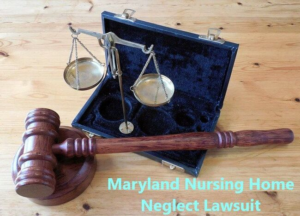Maryland Nursing Home Abuse Lawyer
If Your Loved One Was Abused or Neglected at a Maryland Nursing Home, Our Nursing Home Focused Law Firm Can Help
From Baltimore to Rockville, from Salisbury to Hagerstown, our Maryland nursing home abuse attorneys are here to assist your family after a preventable tragedy in a nursing home or assisted living facility.
At Senior Justice Law Firm, our firm focus is on pursuing justice for wrongfully injured residents of nursing homes. This is all we do.
Let our years of experience in this sub-specialty help your family get answers. Live chat or call us today for a completely free case consultation, to learn more about your legal rights following a Maryland nursing home injury.
Free Maryland Nursing Home Abuse & Neglect Case Consultation: 410-934-3988
Understanding Maryland Nursing Home Negligence Cases
 Maryland is one of the most active states when it comes to retirement and nursing home care—so when you see your loved one make the transition into a long-term care facility in the Old Line State, you probably leave with peace of mind. You assume that he or she will be under the watchful and caring eye of nursing home staff and doctors.
Maryland is one of the most active states when it comes to retirement and nursing home care—so when you see your loved one make the transition into a long-term care facility in the Old Line State, you probably leave with peace of mind. You assume that he or she will be under the watchful and caring eye of nursing home staff and doctors.
Unfortunately, nursing home abuse runs rampant across Maryland. Preventable injuries and neglectful care are more common than you may imagine, and they can lead to abuse, suffering, and wrongful death in Maryland nursing homes.
Most nursing home residents are unable to communicate if they’ve been abused or neglected. This means it is important that you, as the resident’s guardian, monitor your elderly loved one for signs of nursing home abuse and neglect.
Spotting Maryland Nursing Home Abuse and Neglect
How to Recognize Nursing Home Abuse or Neglect in Maryland Facilities
When someone mentions nursing home “abuse,” what they mean is when caregivers fail to provide adequate care to a patient. Elder abuse can also mean elder neglect, or failing to provide care, supervision or services required by an elderly patient.
Elder care facilities review each incoming resident, and if they are unable to provide assistance to that person in a way that fulfills their needs, they must state so and request to move the resident elsewhere.
Unfortunately, most locations are run by for-profit entities, and so it is in their best interest to fill as many beds as possible. This leaves overworked staff to care for upwards of 30 patients each, so most do not receive the time and attention they need. This is called negligence.
On the other hand, abuse is sometimes intentional—such as when a nurse specifically chooses to hit someone or withhold food or water. In the end, though, both negligent and intentional abuse are punishable by Maryland law.
Red Flag Injuries Indicative of Neglect
When negligence or intentional abuse rear their heads at a nursing home, there are a couple of injuries that commonly arise. These are telltale signs of neglect, and you should be aware of what they look like so that you can hold a nursing home accountable if you notice them.
- Falls– Of the injuries that occur as a result of negligence at nursing homes, falls are one of the most common. While it is true that some residents may fall entirely by accident, many times, the nursing home has not taken the proper precautions to prevent falls and can be held liable.
For example, if a patient is a known fall risk but is not supervised and allowed to wander, fails to use rails, alarms or pads, or if a resident lives in a room where trip hazards have not been removed, the nursing home is responsible for negligence. Falls can cause serious injuries, from broken bones and subdural hematomas (brain bleeds) to other unexplained injuries.
- Bedsores– Another extremely common type of abuse that residents in nursing homes often suffer from is bedsores. These injuries, which are pressure ulcers on the skin, develop when a small area of the body is put under pressure for a long time—such as when a patient is lying down for most of the day because of mobility issues.
Bed sores can happen anywhere, though they are most common in areas with thin skin like the tailbone, feet, and shoulders. These sores are considered a “classic” sign of nursing home abuse, since they indicate that staff are not providing sufficient attention to residents. Simply shifting someone every two hours could prevent bedsores.
Once bedsores start, they can progress until they leave a hole in the skin that goes all the way to the bone. This is naturally very painful, and it exposes the resident to potentially deadly conditions like MRSA, infections, and sepsis. Infected wounds that are not timely treated can lead to a nursing home amputation, a particularly grievous injury.
- Malnutrition/dehydration– If a resident at a nursing home is relying on staff for care, this can mean that they struggle to eat or drink as often as they need to, since they have to wait for help. If they have particular dietary restrictions, this problem is even more challenging. When a nursing home doesn’t have enough staff, overwhelmed caregivers can forget to provide food and water, or they might not have time to prepare special meals for individual residents.
This can lead to dehydration and malnutrition as residents don’t receive the food and water that their bodies need. At the same time, nurses who are in a rush to serve other patients may simply hand out food and water and then leave, which puts a resident at risk of choking or aspiration pneumonia, where food “goes down the wrong pipe” and into the lungs. If food is aspirated, it can cause infection.
- Physical abuse– If you have helped your loved one to move into a long-term care facility like a nursing home, it may be hard to believe that the staff there might be cruel or physically abusive. Unfortunately, this is not uncommon, as severely overworked nurses and aides struggle to cope with the huge workload and slow, struggling, or uncooperative residents.
However, this is never an excuse to become physical with someone, and nursing homes are responsible for ensuring that residents are never hit or otherwise abused—either by the staff or by other residents who may struggle with confusion or aggression toward their neighbors. Sexual abuse is also a potential, because background checks on staff can only do so much to prevent hiring someone who may abuse residents in this way.
As with physical altercations, sexual abuse can also come at the hands of other residents, who may be struggling with memory, coherence, or an understanding of their current location. It is the long-term care facility’s responsibility to protect your loved one from both staff and other residents who would seek to harm them.
If you believe that your loved one is suffering from nursing home abuse or neglect anywhere in Maryland, call Senior Justice Law Firm at (410) 934-3988.
Need a Maryland nursing home abuse lawyer who focuses specifically on cases with long-term care facilities? At Senior Justice Law Firm, we want to bring justice to families whose loved ones have been abused or neglected in a nursing home.

Available Damages in a Maryland Nursing Home Abuse Lawsuit
When people pursue lawsuits against nursing homes for abuse in Maryland, they often remark that it is more important that the nursing home is punished than that they receive monetary compensation. After all, money cannot undo the suffering that their loved one experienced while at the long-term care facility.
However, fighting for monetary damages is the most effective way to punish nursing homes, because they are typically run by for-profit organizations that are seeking to increase their revenues. By forcing the offending Maryland nursing home to pay fines and monetary damages, you are incentivizing them to mitigate their losses in the future, and so they are more likely to change how the nursing home is managed. If a nursing home pays your family tens of thousands of dollars, they are going to take steps to ensure this does not happen again. This improves outcomes for other patients and can result in better staffing and care.
As part of compensation for a nursing home abuse lawsuit in Maryland, you may go after the nursing home on grounds such as:
- Pain and suffering
- Loss of consortium (when someone is deprived of the family benefits of having a loved one, such as affection and relations)
- Loss of enjoyment of life
- Distress, both mental and emotional
- Medical bills
- Loss of earnings
- Funeral costs (if a wrongful death has occurred)
If you can prove that a nursing home committed abuse so severe that it passes from “negligence” into “gross negligence,” you can punish the facility even more severely.

Inadequate Care Provided in Maryland Nursing Homes
Maryland Nursing Homes Score Low
Maryland is a hot spot for retirees and those getting on in years, not only due to the fair weather but also the vast array of fun, easy things to do in the state. From a tranquil journey through the Blackwater National Wildlife Refuge near Cambridge to a trip around the Chesapeake Bay Loop or a stop at Horseshoe Casino in Baltimore, the older residents of the state have plenty to enjoy. This means that long-term care facilities in the state are often quite full of people who want to retire in Maryland.
When nursing homes are inspected yearly, they received a rating based upon a large number of factors set by the government, from staff to patient ratio to resident hydration and nutrition. Even in elder care facilities that receive favorable scores during these reviews, nursing home abuse is still possible; a good review of a facility does not necessarily mean that your loved one is safe from neglect.
There are more than 200 nursing homes across the entire state of Maryland, and unfortunately, many have been directly cited for abuse and neglect that was discovered in their facilities. The average rating of nursing homes in the state trends low, with the highest scores seen among locations with a small number of beds (usually around 30) and facilities owned by nonprofit organizations.
Many of Maryland’s worst rated nursing homes are clustered around Baltimore. However, other poorly rated nursing home hot spots include Prince George’s County, Anne Arundel County, Montgomery County, Howard County and Frederick County. Our Maryland nursing home abuse attorney represents victims’ families across Maryland in all 24 counties.
Regardless of whether your loved one’s nursing home received a good review, keep an eye out for proper treatment. If you suspect neglect or abuse, reach out to an experienced nursing home abuse lawyer in Maryland who can guide you through the next steps to ensure that the facility is punished and the standard of care changed—for the sake of both your family and the other residents.
Nursing Homes in Maryland
There are more than 200 nursing homes in Maryland, but some have been specifically cited with low reviews or direct evidence of elder abuse and neglect for which they have been fined. Some of these include:
|
Maryland Nursing Home News
Maryland is one of the most popular areas for retirees and older citizens to live, and this means that it boasts a large number of elder care facilities and nursing homes. Unfortunately, those long-term care locations are often in the news—and not for the right reasons.
The Peak Healthcare at Caton Manor facility (listed above) was recently added to the state’s directory of Nursing Homes with a History of Serious Issues due to abuse and neglect evidence that was found at the location. Recent reports from The New York Times noted that the state’s nursing homes tend to be profit-focused rather than appropriately focusing on care.
“Last fall, the Centers for Medicare and Medicaid [Services or CMS] changed the formula for reimbursing nursing homes, making it more profitable to take in sicker patients.” This is part of the reason why so many nursing homes in Maryland contain hundreds of beds despite the same number of staff as 50-bed facilities. It encourages nursing homes to accept everyone for the sake of profit, even when they are not able to provide a sufficient standard of care. Other Maryland nursing home were ill equipped to deal with coronavirus, which caused many downstream injuries like broken bones, bed sores and wrongful death.
Weighing Your Options with a Maryland Nursing Home Abuse Lawsuit?
Free Consultation for Maryland Nursing Home Neglect Cases
 If you suspect that your loved one may be experiencing abuse or neglect in a Maryland nursing home, you may be confused about what to do next. Maybe you’ve already spoken with staff at the facility and nothing has been done. You might have already called, and been rejected by, a local car accident lawyer.
If you suspect that your loved one may be experiencing abuse or neglect in a Maryland nursing home, you may be confused about what to do next. Maybe you’ve already spoken with staff at the facility and nothing has been done. You might have already called, and been rejected by, a local car accident lawyer.
At Senior Justice Law Firm, this is what we do. We oftentimes can help a family seek justice and compensation, even where other firms could not.
We only get paid if we make a recovery on your case, and our consultations are free. Live chat with us online or call us today so we can discuss your situation and help you come up with a strategy for how to proceed.
Our sole focus in law is in nursing home abuse. This means we have the resources and experience to help you fight against the nursing home that hurt your family member. Get in touch by using our chat feature or submitting your information below.
You can also contact us via phone at (410) 934-3988.

